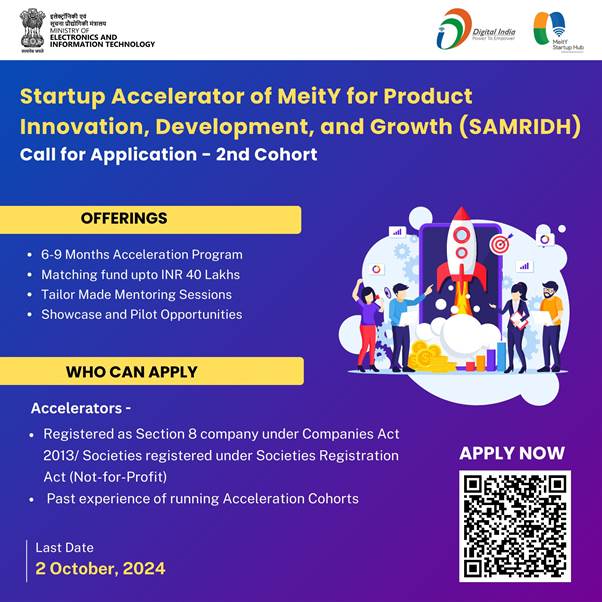125 startups will be selected and supported through potential accelerators; To be provided with funding support and mentorship
The Ministry of Electronics and Information Technology (MeitY) is working for the growth of India’s software product industry under the National Policy on Software Products (NPSP) – 2019. Indian software product industry including startups are being supported through various programmes such as Centre of Excellences, Technological Incubation and Development of Entrepreneurs (TIDE) programme, Next Generation Incubation Scheme (NGIS), ICT Grand Challenges, Gen-Next Support for Innovative Startups (GENESIS) etc.
About SAMRIDH: Bolstering Indian Software Startups
SAMRIDH is a flagship programme of MeitY for startups acceleration under National Policy on Software Products – 2019. The SAMRIDH programme, launched in August 2021 aims to support 300 software product startups with outlay of ₹99 crore over a period of 4 years. SAMRIDH is being implemented through potential and established accelerators across India which provide services like making products market fit, business plan, investor connect and international expansion to startups plus matching funding upto ₹40 lakh by MeitY. The scheme is being implemented by MeitY Start-up Hub (MSH), Digital India Corporation (DIC).
Diverse Accelerator Network for SAMRIDH
As part of this programme, the second cohort SAMRIDH was launched yesterday (4th September, 2024) by Secretary, MeitY Sh. S. Krishnan. It is a part of the 100-day agenda of the Government of India to select and support 125 startups through potential accelerators so as to achieve the target of nurturing 300 startups. The interested accelerator may apply for 2nd cohort of SAMRIDH at
https://msh.meity.gov.in/schemes/samridh

In the first cohort of SAMRIDH, 22 accelerators from 12 States were selected through open calls for proposals. List of accelerators compromises of Government Supported Organizations, Academic Institutions, Private sector and early-stage start-up funding platforms. These accelerators then select 5-10 startups each in the focused areas of health-tech, ed-tech, agri-tech, consumer-tech, fin-tech, Software as a service (SaaS), and sustainability through a multi-level screening process.



